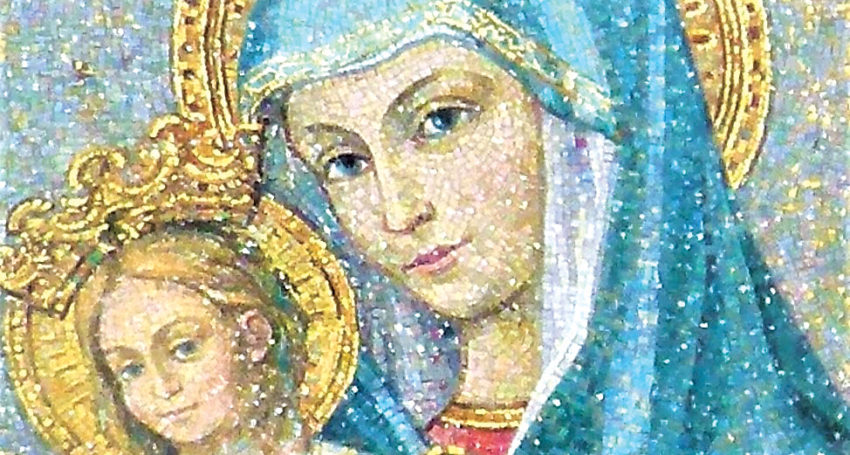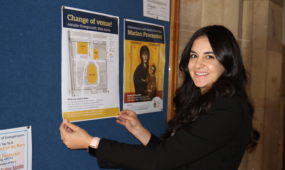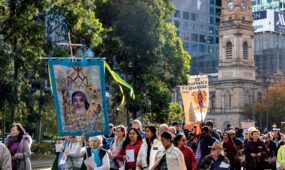Mary the prophet
Opinion
‘A pregnant woman is not the usual image that comes to mind when one thinks of a prophet,’ writes the American theologian Elizabeth Johnson in her book Truly our Sister, yet in the first chapter of Luke’s Gospel we come face to face with two Spirit-filled pregnant prophets doing exactly what prophets do: speaking aloud God’s truth.

We refer, of course, to Mary and Elizabeth. Both were grappling with how to deal with their newfound circumstances: Elizabeth as a first- time mother in her old age and Mary as the unmarried, pregnant bride suspected of infidelity to her betrothed. However, both shared the distinction of being ‘mothers of redemption’ since Jesus was to be the Messiah and John the Baptist his herald.
Luke paints the picture of the two women visiting together. No male character is in sight. When Mary arrives Elizabeth feels the child in her womb ‘leap for joy’ and she exclaims, ‘Blessed are you among women and blessed is the fruit of your womb’. In response, Mary sings the exuberant Gospel canticle, the Magnificat (Lk 1:46-55).
Advertisement
This canticle is one of the chief prayers of the Church, prayed daily as the Gospel Canticle of Evening Prayer. It has two parts – the first overflowing with joy for the great things that God has done for Mary, and the second reflecting on the wonderful actions of God throughout the history of the Chosen People.
It sings about the faithfulness and compassion of God that give rise to personal, moral, social and economic liberation. The beneficiaries of God’s actions have not been the rich and powerful, but the poor and lowly, those who look to God for solace and comfort, those who suffer hunger and oppression. This woman prophet is proclaiming aloud the mighty deeds of God – strength and power on the one hand, mercy and forgiveness on the other.
When Mary sings ‘My soul magnifies the Lord’ her whole body and spirit is celebrating the goodness and greatness of God. She is experiencing utter delight. Mary is to be the Mother of God because the light of God has shone upon her. She, a lowly woman who belongs to a people oppressed and exploited by foreign rulers, has been called to cooperate with God in the great work of redemption. Mary is not simply being humble when she calls herself ‘lowly’; she is stating a fact. And this should give us great hope in our own lives: no matter how insignificant we might be in the eyes of society, God is able to ‘do great things for us’.
Advertisement
The second part of the canticle reveals what, in modern parlance might be called ‘God’s option for the poor’. The usual pattern that sees power and wealth prevail is completely overturned. It is the poor and the lowly that God raises up; it is the hungry who are ‘filled with good things’.
Mary is pre-empting what Jesus himself will announce in the synagogue in Nazareth: ‘The Spirit of the Lord is upon me, because he has anointed me to bring good news to the poor. He has sent me to proclaim release to the captives and recovery of sight to the blind, to let the oppressed go free, and to proclaim the year of the Lord’s favour.’ (Lk 4:18)
Both Mary’s Magnificat and Jesus’ words in the synagogue can be interpreted as words of revolution. People are suffering because they are forced to pay taxes to both their Roman oppressors and their religious masters. And yet the good news of the coming Kingdom of God is that it will be the poor and brokenhearted who will find justice, be comforted and indeed exalted. Mary’s Magnificat can be seen as conveying a subversive message that will encourage the downtrodden and give hope to the oppressed.
Related Story
 Events
Events
Marian Procession tradition continues at new venue
Mary’s beautiful song celebrates God’s goodness to both the individual and the community. She stands in solidarity with the poor and lowly; she reminds them of God’s faithfulness to promises made long ago; she rejoices that God has ‘done great things for her’.
Let us join Mary, the prophet, as we pray her words each day. Let us give thanks to our gracious and loving God who chooses the lowly as co-workers and heralds. Let us commit ourselves to justice for those oppressed in any way, and let us rejoice that it was the voice of a woman that spoke God’s truth before she brought to birth God’s very Word.
Dr Jenny O’Brien is manager of the Office for Worship
MAGNIFICAT
My soul magnifies the Lord
and my spirit rejoices in God,
my Saviour,
for he has looked upon his
handmaid in her lowliness;
and from this day forward
For the Almighty has done great
things for me and holy is his name.
His mercy is from age to age
for those who fear him.
He has made known the strength of
his arm, and has scattered the
proud in the conceit of their heart.
He has cast down the mighty from
their thrones and exalted those
who are lowly.
He has filled the hungry with good things and sent the rich away empty.
He has helped his servant Israel,
mindful of his mercy,
even as he promised to our fathers,
to Abraham and his descendants forever.







Comments
Show comments Hide comments